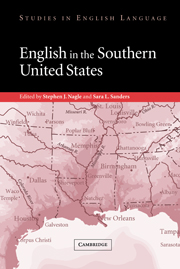Book contents
- Frontmatter
- Contents
- Notes on the contributors
- Acknowledgments
- Introduction
- 1 The origins of Southern American English
- 2 Shakespeare in the coves and hollows? Toward a history of Southern English
- 3 Eight grammatical features of southern United States speech present in early modern London prison narratives
- 4 The shared ancestry of African-American and American-White Southern Englishes: some speculations dictated by history
- 5 The complex grammatical history of African-American and white vernaculars in the South
- 6 Grammatical features of southern speech: yall, might could, and fixin to
- 7 Sounding southern: a look at the phonology of English in the South
- 8 Vowel shifting in the southern states
- 9 Enclave dialect communities in the South
- 10 Urbanization and the evolution of Southern American English
- 11 The Englishes of southern Louisiana
- 12 Features and uses of southern style
- References
- Index
5 - The complex grammatical history of African-American and white vernaculars in the South
Published online by Cambridge University Press: 22 September 2009
- Frontmatter
- Contents
- Notes on the contributors
- Acknowledgments
- Introduction
- 1 The origins of Southern American English
- 2 Shakespeare in the coves and hollows? Toward a history of Southern English
- 3 Eight grammatical features of southern United States speech present in early modern London prison narratives
- 4 The shared ancestry of African-American and American-White Southern Englishes: some speculations dictated by history
- 5 The complex grammatical history of African-American and white vernaculars in the South
- 6 Grammatical features of southern speech: yall, might could, and fixin to
- 7 Sounding southern: a look at the phonology of English in the South
- 8 Vowel shifting in the southern states
- 9 Enclave dialect communities in the South
- 10 Urbanization and the evolution of Southern American English
- 11 The Englishes of southern Louisiana
- 12 Features and uses of southern style
- References
- Index
Summary
Introduction
In October 1981 Michael Montgomery and Guy Bailey organized the first conference on Language Variety in the South (LAVIS I) at the University of South Carolina, Columbia, where for the first time scholars discussed research and exchanged ideas about the history of and relationship between Southern American English (SAE) and African-American Vernacular English (AAVE). The general consensus from the research presented at the conference, and later chronicled in a volume of essays (Montgomery and Bailey 1986), was that SAE is a far more complex variety than had previously been noted, specifically in regard to the shared social and linguistic histories of African Americans and whites and their resulting vernaculars. Establishing the relationship between AAVE and the vernacular English of southern whites, referred to here and elsewhere as Southern White Vernacular English (SWVE), has proven to be a difficult task, and as a result there are still many unresolved issues surrounding the origins of AAVE – specifically its phonological and grammatical history – and how that history relates to the history of SWVE. Not surprisingly, the debates that have emerged over the past half century can oftentimes be attributed to methodological practices (and sometimes malpractices) in the research that have led to varying hypotheses concerning the relationship of these two varieties.
- Type
- Chapter
- Information
- English in the Southern United States , pp. 82 - 105Publisher: Cambridge University PressPrint publication year: 2003
- 4
- Cited by



